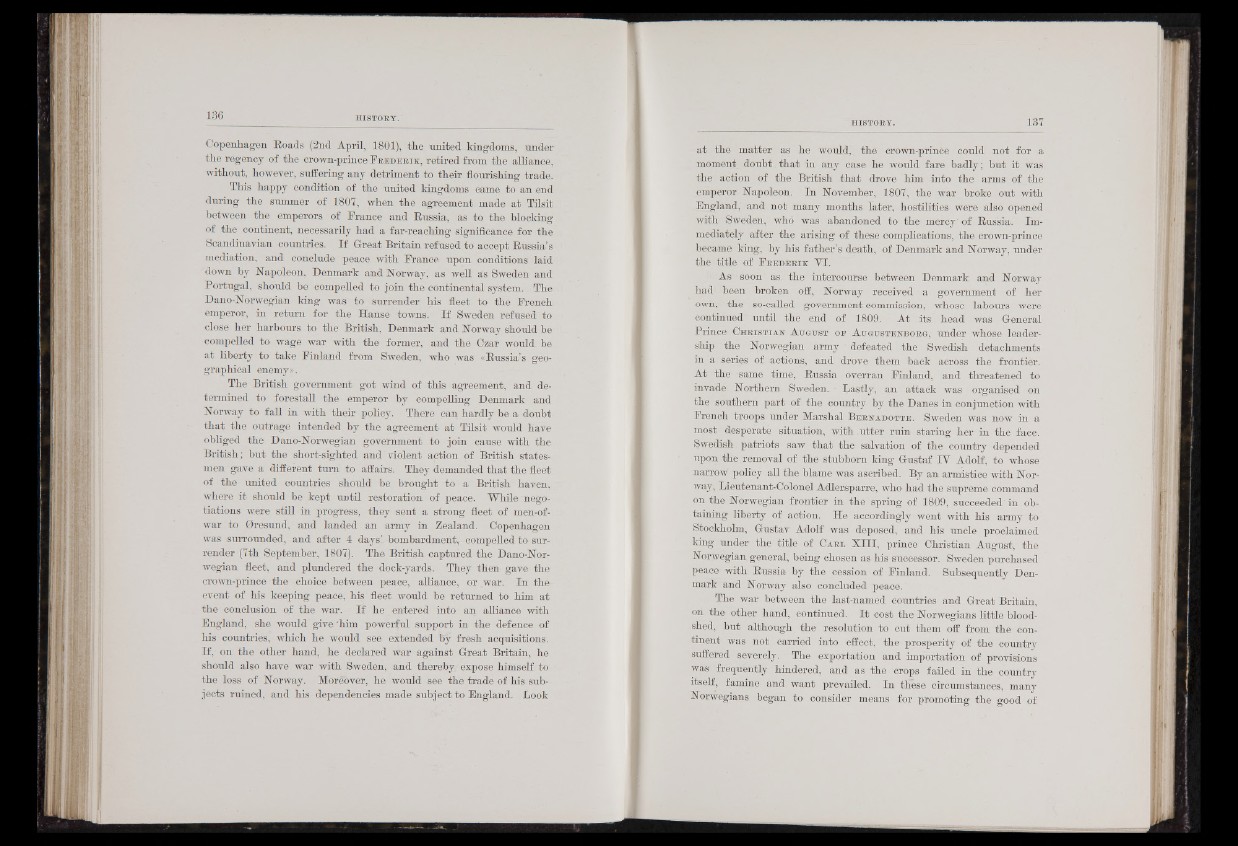
Copenhagen Roads (2nd April, 1801), the united kingdoms, under
the regency of the crown-prince F b e d e b i k , retired from the alliance,
without, however, suffering any detriment to their flourishing trade.
This happy condition of the united kingdoms came to an end
during the summer of 1807, when the agreement made at Tilsit
between the emperors of France and Russia, as to the blocking
of the continent, necessarily had a far-reaching significance for the
Scandinavian countries. If Great Britain refused to accept Russia's
mediation, and conclude peace with France upon conditions laid
down by Napoleon, Denmark and Norway, as well as Sweden and
Portugal, should be compelled to join the continental system. The
Dano-Norwegian king was to surrender his fleet to the French
emperor, in return for the Hanse towns. If Sweden refused to
close her harbours to the British, Denmark and Norway should be
compelled to wage war with the former, and the Czar would be
at liberty to take Finland from Sweden, who was «Russia’s geographical
enemy».
The British government got wind of this agreement, and determined
to forestall the emperor by compelling Denmark and
Norway to fall in with their policy. There can hardly be a doubt
that the outrage intended by the agreement at Tilsit would have
obliged the Dano-Norwegian government to join cause with the
British; but the short-sighted and violent action of British statesmen
gave a different turn to affairs. They demanded that the fleet
of the united countries should be brought to a British haven,
where it should be kept until restoration of peace. While negotiations
were still in progress, they sent a strong fleet of men-of-
war to 0resund, and landed an army in Zealand. Copenhagen
was surrounded, and after 4 days! bombardment, compelled to surrender
(7th September, 1807). The British captured the Dano-Norwegian
fleet, and plundered the dock-yards. They then- gave the
crown-prince the choice between peace, alliance, or war. In the
event of his keeping peace, his fleet would be returned to him at
the conclusion of the war. If he entered into an alliance with
England, she would give 'him powerful support in the defence of
his countries, which he would see extended by fresh acquisitions.
If, on the other hand, he declared war against Great Britain, he
should also have war with Sweden, and thereby expose himself to
the loss of Norway. Moreover, he would see the trade of his subjects
ruined, and his dependencies made subject to England. Look
at the matter as he would, the crown-prince could not for a
moment doubt. that in any case he would fare badly; but it was
the action of the British that drove him into the arms of the
emperor Napoleon. In November, 1807, the war broke out with
England, and not many months later, hostilities were also opened
with Sweden, who was abandoned to the mercy of Russia. Immediately
after the arising of these complications, the crown-prince
became king, by his father’s death, of Denmark and Norway, under
the title of F b e d e b i k VI.
As soon as the intercourse between Denmark and Norway
had been broken off, Norway received a government of her
own, the so-called government-commission, whose labours were
continued until the end of 1809. At its head was General
Prince C h r i s t i a n A ttgutsx o f A t jg u s t e n b o e g , under whose leadership
the Norwegian army 1 defeated the Swedish detachments
in a series of actions, and drove them back across the frontier.
At the same time, Russia overran Finland, and threatened to
invade Northern Sweden. - Lastly, an attack was organised on
the southern part of the country by the Danes in conjunction with
French troops under Marshal B e b k a d o t t e . Sweden was now in a
most desperate situation, with .utter ruin staring her in the face.
Swedish patriots saw that the salvation of the country depended
upon the removal of the stubborn king GuStaf IV Adolf, to whose
narrow policy all the blame was ascribed. By an armistice with Norway
, Lieutenant-Colonel Adlersparre, who had the supreme command
on the Norwegian frontier in the spring of 1809, succeeded in obtaining
liberty of action. He accordingly went with his army to
Stockholm, Gustav Adolf- was deposed, and his uncle proclaimed
king under the title of C a b l XIII, prince Christian August, the
Norwegian general, being chosen as his successor. Sweden purchased
peace with Russia by the cession of Finland. Subsequently Denmark
and Norway also concluded peace.
; The war between the last-named countries and Great Britain,
oh the other hand, continued. I t cost the Norwegians little bloodshed,
but although the resolution to cut them off from the continent
was not carried into effect, the prosperity of the country
suffered severely. The exportation and importation of provisions
was frequently hindered, and as the crops failed in the country
itself, famine and want prevailed. In these circumstances, many
Norwegians began to consider means for promoting the good of